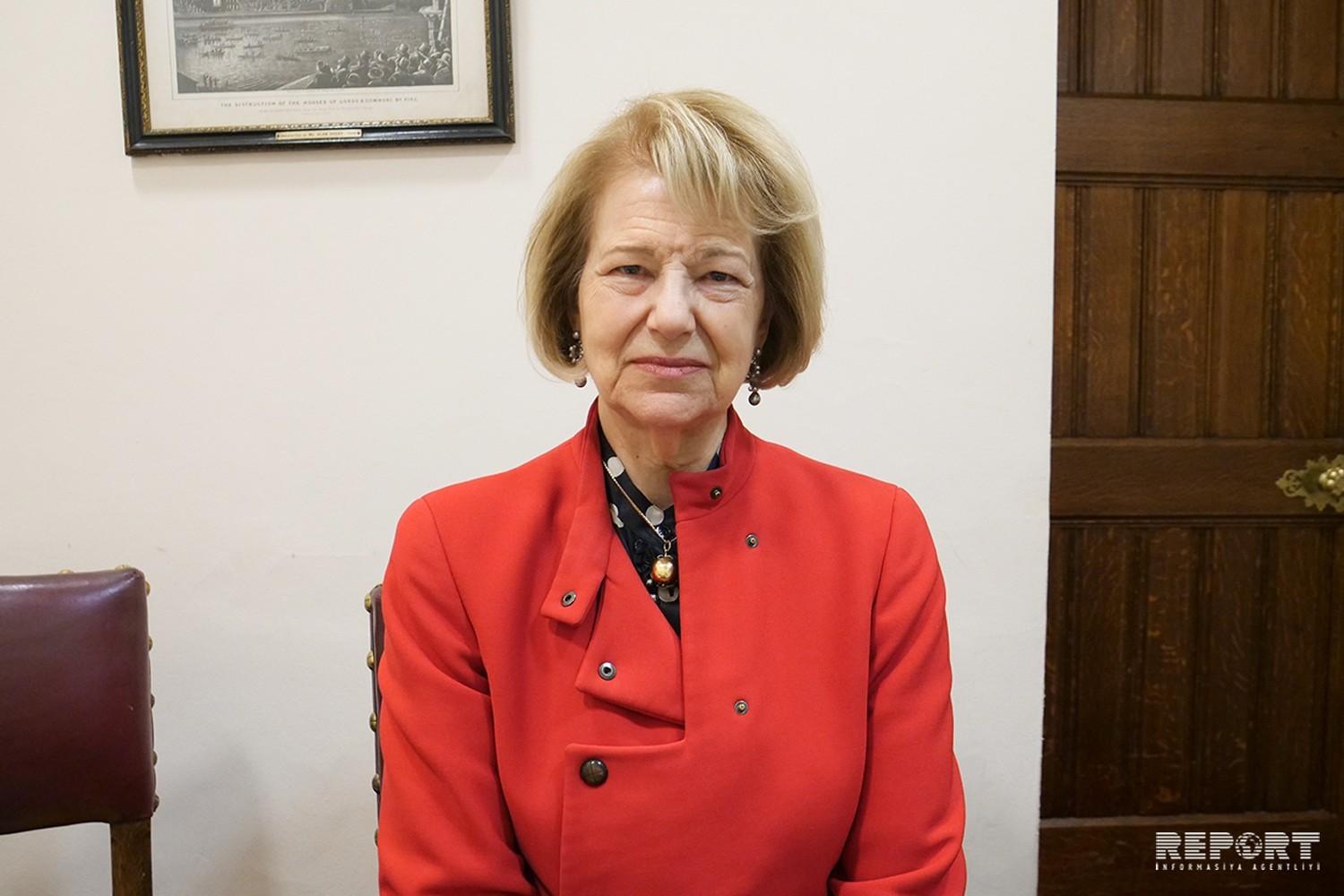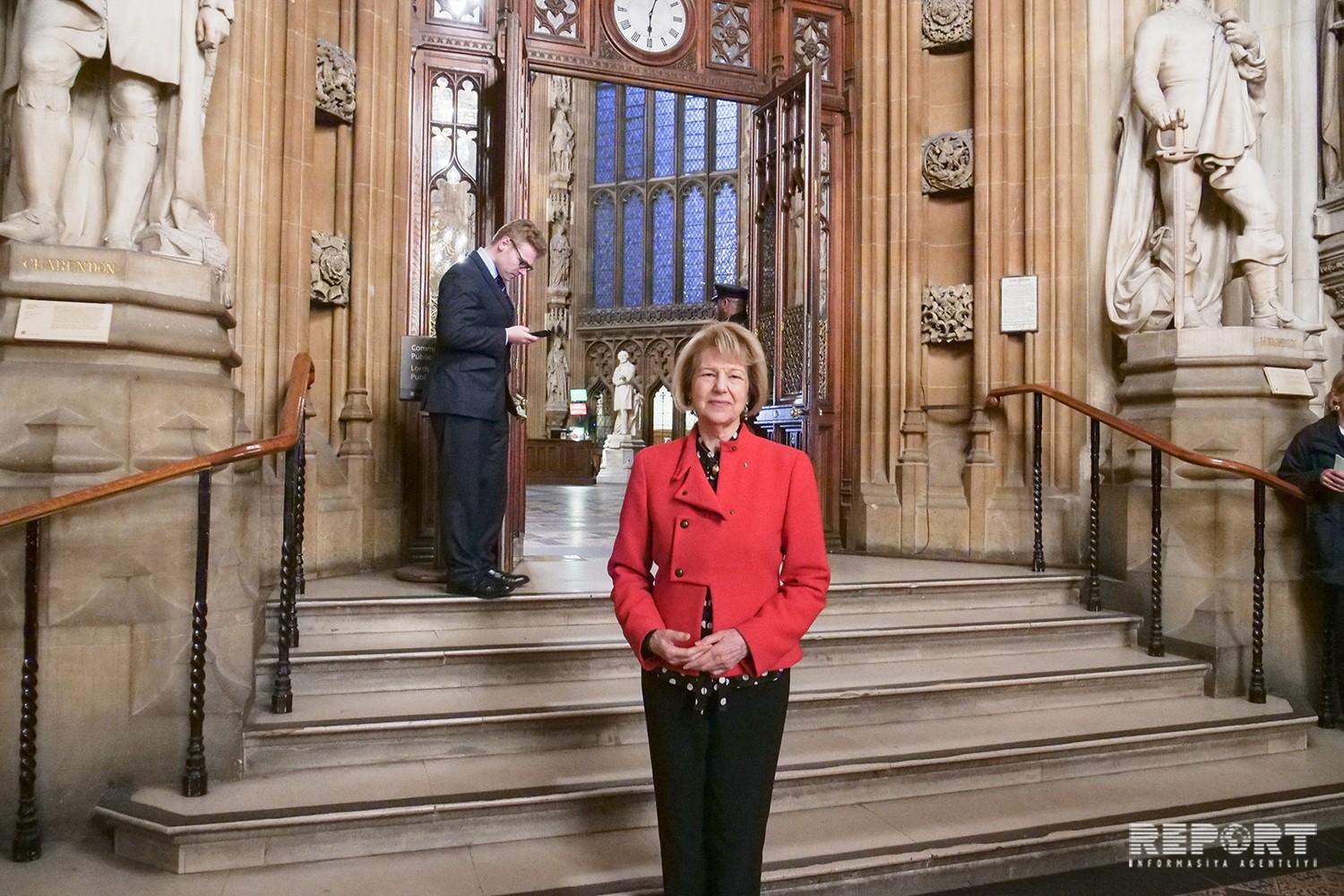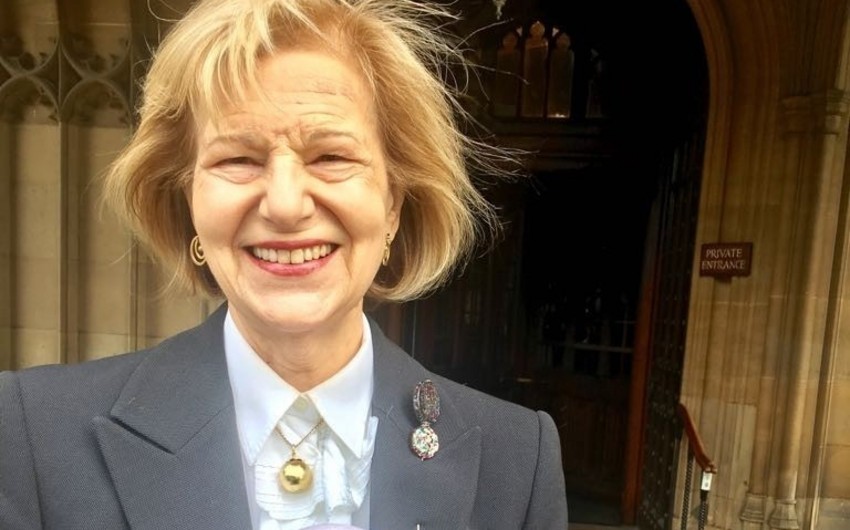Report interviews UK Prime Minister's Trade Envoy to Azerbaijan, Baroness Emma Nicholson.
How do you assess the current economic relations between Azerbaijan and the UK?
Our relations are excellent! We are fundamentally alike in that both our countries want prosperity for our people. Our young people want and need employment and broader opportunities. We have much experience to share, and I am glad that British experts have visited Azerbaijan in the last year to discuss – amongst other things – taxation, waste management, agriculture, and elite sport.
As the Trade Envoy for Azerbaijan appointed by Boris Johnson, the Prime Minister, I see clearly how many Azerbaijani delegations visit the UK each year. I meet business delegations from across sectors, from health and agriculture to education and space. Such visits create excellent contacts between Azerbaijani entrepreneurs and their British counterparts. And our Ministerial dialogue is intensive too. In the autumn, our annual Joint Intergovernmental Commission talks will take place in Baku – another boost for our bilateral economic cooperation.
Away from the world of business, I have enjoyed leading an exceptional educational partnership between our countries. As well as the many connections between the UK and Azerbaijani schools and universities, the British Government is investing in Learning Hubs to bring cutting edge English Language training to children from families internally displaced by conflict.
The growth of the British Council's 'Creative Spark' program, and the excitement it creates, show it is a perfect fit with Azerbaijan's needs. I hope that partnerships within the creative industries continue to flourish. Music and performing arts exchanges are growing, such as the spectacular visit to Baku of the Candoco dance group, organized by the British Council. The British Council's 'Crafting Futures' program is also generating excellent artisanal relationships, such as The Prince's School of Traditional Arts' engagement with Azerbaijan.
How does the UK assess the Southern Gas Corridor project and the role of Azerbaijan in energy security issues?
The Southern Gas Corridor pipeline is an extraordinary engineering project, which I have been involved with for some years. It is an excellent means both for Azerbaijan to deliver its gas to a prosperous market and for Europe to increase its energy security and diversity of supply. Our energy partnership is excellent. The partnership agreement between Azerbaijan and the UK, alongside our world-class operators SOCAR and BP, will ensure that Azerbaijan benefits from the latest oil and gas extraction technologies.

The energy market will transform over the next decade, generating new opportunities for investment in Azerbaijan. Climate change requires a dramatic shift in the way in which we all produce our energy. As the world pivots towards lower-carbon technologies, nations will need to make new commitments to reduce their emissions. The COP26 conference in Glasgow in November will be a crucial opportunity for both of our countries to take the necessary measures to address climate change. Azerbaijan has moved forward in this area by commissioning solar energy projects, and the UK is ready to invest in the sector to help maximize Azerbaijan's solar, wind, and hydro generation potential.
BP has just announced its commitment to be a "net-zero" company in terms of its carbon emissions. That is a significant step forward and a sign that the COP26 process is building momentum. I hope that SOCAR and all operators in Azerbaijan will make a similar commitment.
Is there a potential for improving the trade turnover between the two countries? What areas of economic cooperation can be developed?
The current level of economic and trade relations is impressive, but I would like to see it increased in both directions to improve the prosperity of our partner nations. Azerbaijani agricultural produce, including wine, is delicious, and I am sure it would be accessible in the UK if it can be brought to the market there. British exporters will continue to seek new ways to meet demand here. We are hoping, for example, to exhibit British products at the ADEX trade show in Baku later this year.
I am taking advantage of my role in developing bilateral trade. I am looking forward to my visit at the end of February at which I will be representing the Prime Minister at the Southern Gas Corridor Advisory Council. Later in the year, we plan to hold a Ministerial Foreign Policy Dialogue – we have an essential bilateral agenda to discuss, including trade policy, as well as regional issues, where Azerbaijan has vital insights.
I also hope to return to Baku in the autumn for what will be my seventh visit in this role. My work as a trade envoy is deeply satisfying because I can assist our two independent nations to develop in partnership while getting to know this beautiful country.

How can the UK help diversify Azerbaijan's economy and develop its non-oil sector?
Our economic and trade relations with Azerbaijan go beyond energy, oil, and gas. The UK's Department for International Trade (DIT) has been very actively working towards this organizing visits of Azerbaijani companies and government structures from various sectors to the UK to learn experience and build partnerships.
We can always do more to bring our entrepreneurs together. The UK government ran a 'Roadshow' at the end of January, which took experts in Azerbaijan to meet British firms and investors in London, Oxford, Manchester, and Coventry. In February, DIT and the Embassy led a large health delegation to London and Oxford, and a joint team from the British Embassy in Baku and SOCAR presented at UK Subsea in Aberdeen. This is typical of our intensive efforts to increase trade and investment in both directions.
Can we expect an increase in UK investment in Azerbaijan's non-oil sector? If yes, in what projects and in what volumes?
There is an excellent potential for investment and trade between our countries, and for Azerbaijan to diversify its economy and build out from its robust oil and gas sector. I am happy to support this strategy and the reforms to the business environment which are taking place in Azerbaijan.
The UK left the EU on January 31. How will cooperation with third countries, for example, with Azerbaijan, be implemented, in your opinion? Does the UK plan to sign any new agreement with Azerbaijan to frame the bilateral cooperation?
As the UK becomes an independent trading nation, we are freer to trade and develop partnerships with Azerbaijan. We hope very much to take advantage of this opportunity and the Ministry of Foreign Affairs' statement in January, saying that it wished to see our economic relations improved, was a welcome reflection of the UK's wishes.


 https://static.report.az/photo/3bf62c75-13aa-4f90-a3a8-054a20416d8c.jpg
https://static.report.az/photo/3bf62c75-13aa-4f90-a3a8-054a20416d8c.jpg

